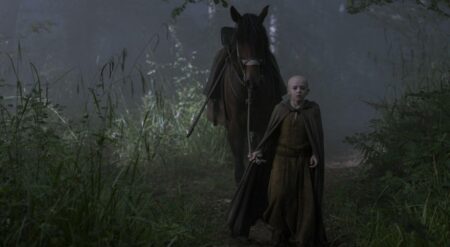A super-powered family wallowing under the depths of modern problems sounds like a recipe for success. Starring Jang Ki-yong and Chun Woo-hee, it seems like The Atypical Family has enough of a hook to hit the ground running at the beginning. Unfortunately, inconsistent pacing and an overreliance on sometimes illogical twists and turns in an attempt to keep viewers on their toes renders this latest Netflix Kdrama a struggle to get through. And that’s before one even tackles the fat suit usage in the series.
The Atypical Family presents audiences immediately with the Bok family’s crisis. The matriarch, Bok Man-heum (Ko Du-shim), struggles to sleep, so she can no longer have visions in her sleep. Her daughter, Bok Dong-hee (Claudia Kim), can no longer fly seemingly due to her obesity (which is proven not to be the case towards the end of the series). Her son, Bok Gwi-ju (Jang Ki-yong), can no longer travel into the past due to his guilt-induced depression. And Gwi-ju’s daughter, I-na (Park So-yi), has no powers, which is unheard of in the family.
A chance meeting with the mysterious Do Da-hae (Chun Woo-hee) initially seems to be what Man-heum thinks the family needs. But Don-hee, Gwi-ju, and I-na are rightfully suspicious. Within the first two episodes, it’s revealed that Da-hae is a scammer, a reveal that arguably comes too soon. In fact, this reveal happening so quickly is a note that can be applied throughout The Atypical Family. Bouncing from one revelation to the next, there’s never a moment to let the characters and, by extension, the audience breathe.
Da-hae infiltrates the Bok family on the orders of Baek Il-hong (Kim Keum-soon). There’s nothing typical about Il-hong and the “family” she’s built to scam people. Da-hae gets pulled into Il-hong’s trajectory after her father dies, with debts left unpaid. The burden of responsibility falls on Da-hae, and Il-hong takes advantage of the girl’s weakness. Along with the beautifully fit Grace Kang (Ryu Abel) and the silently intimidating Noh Hyeong-tae (Choi Kwang-rok), the four of them make for a formidable enemy.
Characters struggle to balance against each other in Atypical Family.

The first half of The Atypical Family shows Da-hae’s skill at manipulation, but she’s not all hard edges. The revelation that Gwi-ju and his family are, in fact, superpowered unlocks a certain layer of fatigue and vulnerability. As she learns more about Gwi-ju’s tragic past and he develops feelings for her at an unbelievable speed, the guilt grows. It isn’t until Da-hae makes the fateful decision to reveal the truth at their wedding that she’s able to truly start the process of freeing herself from Il-hong.
The second half of The Atypical Family dives further into developing Gwi-ju’s powers, playing around with time travel in a progressively more convoluted way. In connection with Man-heum’s visions, it all culminates in a dramatic finale that feels rushed and leaves more questions than answers. But, for most of the characters, a happy ending is revealed.
At twelve episodes, The Atypical Family needed more time to flesh out some elements of its story. The inevitable romance between Gwi-ju and Da-hae fails to develop naturally due to the speed at which events take place onscreen. This expedited development shows itself in actor Jang Ki-yong’s acting, particularly at the series’ halfway point. Chun Woo-hee has the easier time as the hesitant Da-hae, giving some wiggle room as things go full steam ahead. But the end result is the romance not hitting quite like it could.
Disappointing from the beginning is the character of Dong-hee. The first warning sign is the inclusion of an egregious fat suit. The second warning sign is how the character is mostly the butt of ridicule both in the familial home and out of it for the bulk of her season. While the revelation for her character’s malaise is revealed towards the end of the series, the majority of Dong-hee’s plot is spent eating, exercising, or being treated poorly. Korean beauty standards aside, this is a disservice to the character and to Claudia Kim, who honestly should have been replaced with a plus-sized actress for this role who would better fit the physicality.
Atypical Family can’t juggle its storyline, and then it adds time travel.

There’s also the inclusion of time travel. Time travel as a superpower or plot device can get tricky because it carries a bag of continuity-related issues. If things aren’t thoroughly explained or if wires cross at any point, the story can become increasingly convoluted. The Atypical Family almost gets there in keeping things rooted, but it becomes more confusing once the time travel powers collide with Man-heum’s visions. This is why the finale reads like it’s gone off the rails.
That’s not to say that the actors don’t try their best amidst continuous plot pivots and underdevelopment. A lot of the characters onscreen in The Atypical Family suffer from being underwritten. But this cast is capable of bringing their skills and talent and adding depth to their performances. It almost glosses over some of the issues present. Almost.
The Atypical Family shines when the plot focuses on being simple. Case in point: I-na’s entire development. Isolating herself from her family and peers, I-na blames herself for her mother’s death. Gifted (or cursed) with the power to read people’s thoughts with eye contact, creating a natural obstacle. It takes interacting with Da-hae, who sees a lot of herself in I-na, for the young girl to explore outside of her comfort zone. Natural conflict arises, but by the series’ end, I-na’s arc feels the most earned and natural. The superpowers are an accessory rather than a plot device.
And therein lies the issue here. The Atypical Family hits the best when it explores the internal workings of its characters. Through exploring Gwi-ju’s depression and savior complex, Da-hae’s trauma, I-na’s fears, etc, the superpowers emphasize the seriousness of what plagues them. That is where the writing is the strongest. Once the powers are used to push things along, particularly as it relates to time and continuity, that’s where it loses control.
On paper and in the beginning, The Atypical Family had promise, and its stacked cast further highlighted that feeling. Unfortunately, the series rushes to the finish line, leaving behind an uneven story with underdeveloped characters in its attempt to do more than needed. Had the series taken its time to give room for its plot and characters to breathe and grow naturally, this Kdrama could have knocked things out of the park.
All twelve episodes of The Atypical Family are streaming exclusively on Netflix.
The Atypical Family
-
Rating - 5.5/105.5/10
TL;DR
The Atypical Family had promise, and its stacked cast further highlighted that feeling. Unfortunately, the series rushes to the finish line, leaving behind an uneven story with underdeveloped characters in its attempt to do more than needed.







